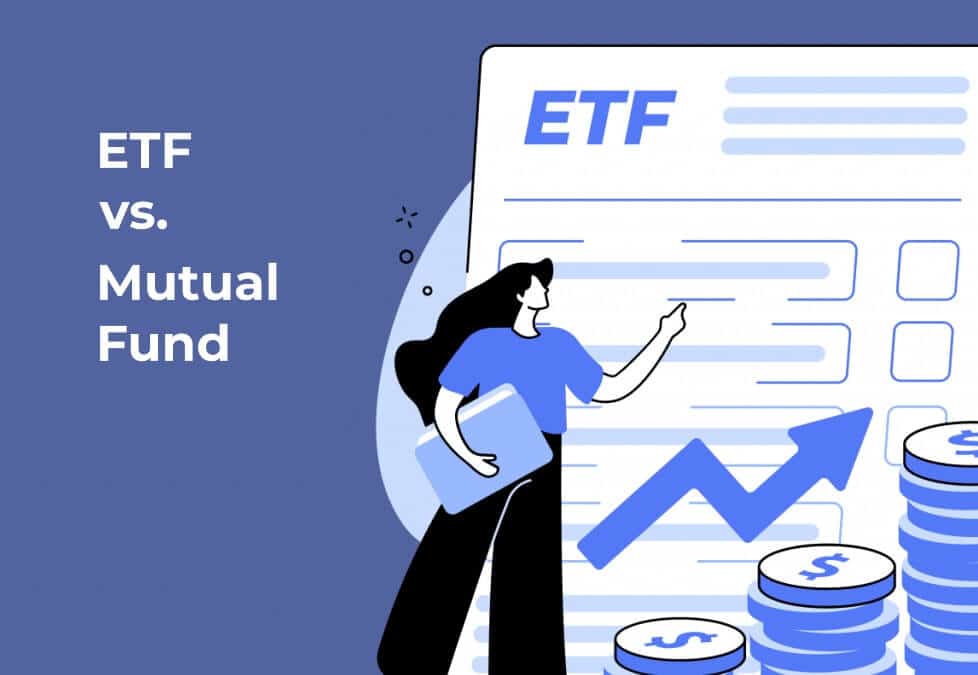Are you curious to find out ETFs or mutual funds which is a better investment choice? This guide will help you learn why ETFs are better than mutual funds.
Exchange Traded Funds (ETFs) and mutual funds are both very popular choices when it comes to enriching your investment portfolio. Both offer instant diversification at a low cost.
However, there are some key differences. The investors intelligence lies in understanding them and investing in the choice that best suits their investment goals and objectives.

The Similarities and Differences
Calculating the total assets, mutual funds have always remained the top dog, but ETFs have shown rapid growth in the last decade. Investors are attracted by the low fees and ease of trading of the latter. However, both options help you to invest in a diversified portfolio by buying only one security.
Mutual funds are a traditional way that allows investors to own shares in a more extensive portfolio. They can be managed actively and might charge higher fees than ETFs. This would include the possibility of sales commission. It comes with a minimum initial purchase requirement that an investor can purchase only after the market has been closed; this is when the Net Asset Value (NAV) has been set after all the calculations.
ETFs are one of the newest ways to allow investors to own a given company’s share in a larger portfolio. These are passively managed and have very low expenses with no sales commission, and it also does not come with initial purchase requirements. ETFs can be traded during the day, and their prices can also fluctuate around their NAV.
Active Management and Passive Management
The cost and potential returns determine how the funds are invested. Some funds engage in active management wherein the manager picks and chooses to buy and sell stocks, and they also decide when to do it. This approach is mainly followed for mutual funds.
Passive investing is dedicated to ETFs. Here the fund manager does not select the investment but mimics an already selected investment. However, ETFs are sometimes actively managed too.
So, in general, it can be stated that while mutual funds are actively managed, ETFs follow a more passive management approach. The difference impacts the investor’s potential returns and expense ratio.
Fund Returns and Costs
It has been noticed statistically that passive investment does great most of the time. Unlike active management, the goal here is not to beat the market. Instead, the passive managers look into the market, and if they outperform the majority of the investors, they are capable of beating the active professional managers.
It means here; the ETFs have the upper hand. Even Though some mutual funds are also managed passively, you would have to read the prospectus thoroughly to know that.
Commissions and Minimum Purchases
When it comes to commissions, ETFs are the straight winners. Here, the commissions have been slashed to zero, which means you will not have to pay anything to trade this. However, some brokers might also impose an early redemption fee in a few cases. It’s an excellent advantage for any investor who wants to save some money during the trade.
In the case of mutual funds, brokers usually charge hefty commissions, which will impact the percentage of the money you earn. However, many good mutual funds are no longer charging commission in the present times, and it is relatively easy to avoid them too.
ETFs are the winners when it comes to the minimum purchase amount. Usually, the broker would ask you to buy a share of a fund for purchasing, but you can buy fractional shares in recent times.
But to purchase mutual funds, you would need to invest a certain amount of money. You can also open your trading account with a smaller subsequent deposit, and some accounts also come with a smaller redemption fee if you sell your position in less than 30 years.
Time of Purchasing
The time of buying ETFs and mutual funds also differs. The mutual funds are priced at the end of a trading day when the market gets closed. You might place the order at any time, but it won’t get fulfilled until the end of the day when the fund gets tallied up. It means that you will not know what to pay unless the transaction is complete.
When it comes to ETFs, they are traded like a stock in exchange. You can buy or sell it like a stock and see the exact price when the order is executed. It means you might end up paying more or less than the NAV, though the difference would be negligible.
Which One is the Better Choice?
ETFs and mutual funds are similar in many ways, so the long-term choice would depend on what the fund is invested in. Remember that actively managed funds might have different results, depending on their investment ways.
Also, there are differences in fees, commissions, and other associated costs. Taking all these into accounts, ETFs have a generalized advantage over mutual funds.
You may also be interested in checking out:
- The Pros and Cons of Taking Financial Advice from TikTok
- The Problem with Asking Your Friends to Lend You Money
- Top 11 Best Accounting Software for Small Business
- What is the Difference Between FAT32 and NTFS and exFAT?